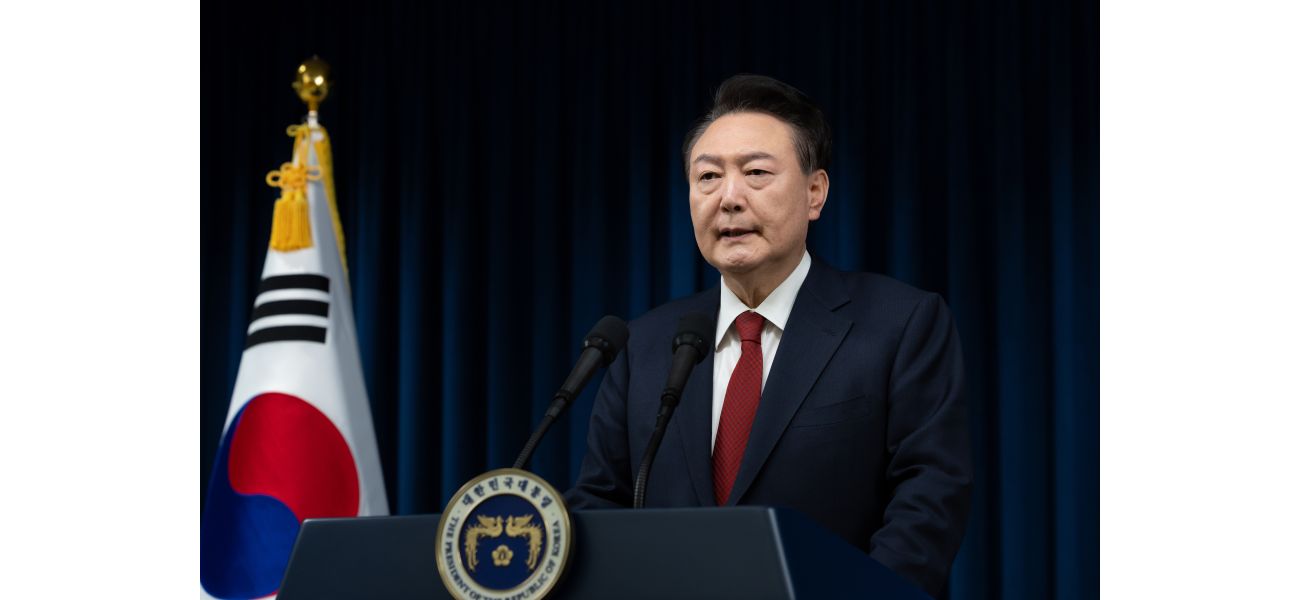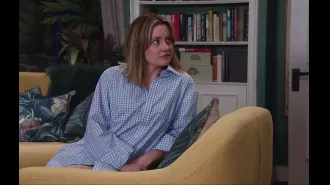South Korean president apologizes for trying to implement martial law and promises not to do it again.
President Yoon Suk Yeol takes responsibility for the declaration and assures not to try again to enforce it.
December 7th 2024.

Today, South Korea's president, Yoon Suk Yeol, made a public apology for the chaos and fear caused by his recent attempt to declare martial law just hours before a crucial vote to impeach him. In a brief televised address this morning, President Yoon took responsibility for his actions and assured the public that he will not make any further attempts to impose martial law.
He also announced that he will leave it to his political party to navigate the current political turmoil in the country, including any decisions regarding his own term in office. The recent declaration of martial law, according to Yoon, was an act of desperation that unfortunately caused a great deal of anxiety and inconvenience to the public. He expressed his sincere remorse and apologized to those who were affected by his actions.
Since taking office in 2022, President Yoon, a conservative, has faced numerous challenges in pushing his agenda through a parliament controlled by the opposition. His approval ratings have also been low due to scandals involving himself and his wife. In his martial law announcement on Tuesday night, Yoon referred to the parliament as a "den of criminals" and vowed to eliminate any anti-state forces and supporters of North Korea.
The National Assembly is set to vote on an opposition-led motion to impeach Yoon this afternoon, but it is uncertain whether the motion will receive the required two-thirds majority to pass. The opposition parties currently hold 192 seats out of the 300 in the legislature, meaning they need at least eight additional votes from Yoon's own party.
The situation became even more uncertain when the leader of Yoon's party called for his removal yesterday, although the party itself remains opposed to impeachment. If Yoon is impeached, his powers will be suspended until the Constitutional Court decides whether to remove him from office. If he is removed, a new election must be held within 60 days.
The events surrounding Yoon's ill-advised attempt at martial law have caused a state of paralysis in South Korean politics and raised concerns among key diplomatic partners, including Japan and the United States. The strong democracy of South Korea is facing a political crisis that could potentially unseat its leader.
The night of the martial law declaration saw special forces troops surrounding the parliament building and army helicopters hovering above. However, the military withdrew after the National Assembly unanimously voted to overturn the decree, forcing Yoon to lift it before daybreak on Wednesday. This was the first time martial law had been declared in South Korea in over 40 years.
In the days following the incident, thousands of people took to the streets of Seoul to protest, with some even changing the lyrics of popular K-pop songs to call for Yoon's resignation. On the other hand, smaller groups of Yoon's supporters held signs opposing the impeachment.
The opposition lawmakers have accused Yoon's actions of being a self-coup and have drafted the impeachment motion on charges of rebellion. The leader of the main liberal opposition party has stated that the only way forward is for Yoon to resign or be impeached immediately.
The National Assembly will meet at 5pm today to vote on a bill appointing a special prosecutor to investigate allegations of influence peddling involving Yoon's wife. They will then vote on the impeachment motion. It is unclear if members of Yoon's party will break ranks and vote to impeach him. Eighteen lawmakers from a minority faction of the party had previously joined the unanimous vote to cancel martial law, but the party as a whole remains opposed to impeachment.
Experts believe that Yoon's party fears the consequences of his impeachment and possible removal from office, which could lead to a disarray among conservatives and a defeat in a presidential by-election. Yesterday, the leader of Yoon's party, Han Dong-hun, called for the suspension of Yoon's constitutional powers, stating that he is unfit to hold office and could potentially take more extreme actions.
Despite Han's call for Yoon's resignation, the party maintains its anti-impeachment stance. Han also claimed to have received intelligence that Yoon had ordered the country's defense counterintelligence commander to arrest and detain certain politicians on accusations of "anti-state activities."
During a closed-door briefing, the first deputy director of South Korea's National Intelligence Service confirmed that Yoon had indeed called and ordered him to help detain these politicians. The targeted politicians included Han, as well as the leader of the National Assembly and the speaker of the House.
The Defence Ministry has suspended the defence counterintelligence commander and two other commanders who were involved in the enforcement of martial law. The former Defense Minister, who is accused of recommending Yoon to declare martial law, is also facing investigation. The Vice Defence Minister has testified that it was the former Defense Minister who ordered troops to be deployed to the National Assembly after Yoon's declaration.
As the situation continues to unfold, the people of South Korea are left with a sense of uncertainty and concern over the fate of their country's leadership. The 9NEWS app is available for those who want to stay updated on the latest news regarding this political crisis.
He also announced that he will leave it to his political party to navigate the current political turmoil in the country, including any decisions regarding his own term in office. The recent declaration of martial law, according to Yoon, was an act of desperation that unfortunately caused a great deal of anxiety and inconvenience to the public. He expressed his sincere remorse and apologized to those who were affected by his actions.
Since taking office in 2022, President Yoon, a conservative, has faced numerous challenges in pushing his agenda through a parliament controlled by the opposition. His approval ratings have also been low due to scandals involving himself and his wife. In his martial law announcement on Tuesday night, Yoon referred to the parliament as a "den of criminals" and vowed to eliminate any anti-state forces and supporters of North Korea.
The National Assembly is set to vote on an opposition-led motion to impeach Yoon this afternoon, but it is uncertain whether the motion will receive the required two-thirds majority to pass. The opposition parties currently hold 192 seats out of the 300 in the legislature, meaning they need at least eight additional votes from Yoon's own party.
The situation became even more uncertain when the leader of Yoon's party called for his removal yesterday, although the party itself remains opposed to impeachment. If Yoon is impeached, his powers will be suspended until the Constitutional Court decides whether to remove him from office. If he is removed, a new election must be held within 60 days.
The events surrounding Yoon's ill-advised attempt at martial law have caused a state of paralysis in South Korean politics and raised concerns among key diplomatic partners, including Japan and the United States. The strong democracy of South Korea is facing a political crisis that could potentially unseat its leader.
The night of the martial law declaration saw special forces troops surrounding the parliament building and army helicopters hovering above. However, the military withdrew after the National Assembly unanimously voted to overturn the decree, forcing Yoon to lift it before daybreak on Wednesday. This was the first time martial law had been declared in South Korea in over 40 years.
In the days following the incident, thousands of people took to the streets of Seoul to protest, with some even changing the lyrics of popular K-pop songs to call for Yoon's resignation. On the other hand, smaller groups of Yoon's supporters held signs opposing the impeachment.
The opposition lawmakers have accused Yoon's actions of being a self-coup and have drafted the impeachment motion on charges of rebellion. The leader of the main liberal opposition party has stated that the only way forward is for Yoon to resign or be impeached immediately.
The National Assembly will meet at 5pm today to vote on a bill appointing a special prosecutor to investigate allegations of influence peddling involving Yoon's wife. They will then vote on the impeachment motion. It is unclear if members of Yoon's party will break ranks and vote to impeach him. Eighteen lawmakers from a minority faction of the party had previously joined the unanimous vote to cancel martial law, but the party as a whole remains opposed to impeachment.
Experts believe that Yoon's party fears the consequences of his impeachment and possible removal from office, which could lead to a disarray among conservatives and a defeat in a presidential by-election. Yesterday, the leader of Yoon's party, Han Dong-hun, called for the suspension of Yoon's constitutional powers, stating that he is unfit to hold office and could potentially take more extreme actions.
Despite Han's call for Yoon's resignation, the party maintains its anti-impeachment stance. Han also claimed to have received intelligence that Yoon had ordered the country's defense counterintelligence commander to arrest and detain certain politicians on accusations of "anti-state activities."
During a closed-door briefing, the first deputy director of South Korea's National Intelligence Service confirmed that Yoon had indeed called and ordered him to help detain these politicians. The targeted politicians included Han, as well as the leader of the National Assembly and the speaker of the House.
The Defence Ministry has suspended the defence counterintelligence commander and two other commanders who were involved in the enforcement of martial law. The former Defense Minister, who is accused of recommending Yoon to declare martial law, is also facing investigation. The Vice Defence Minister has testified that it was the former Defense Minister who ordered troops to be deployed to the National Assembly after Yoon's declaration.
As the situation continues to unfold, the people of South Korea are left with a sense of uncertainty and concern over the fate of their country's leadership. The 9NEWS app is available for those who want to stay updated on the latest news regarding this political crisis.
[This article has been trending online recently and has been generated with AI. Your feed is customized.]
[Generative AI is experimental.]
0
0
Submit Comment





